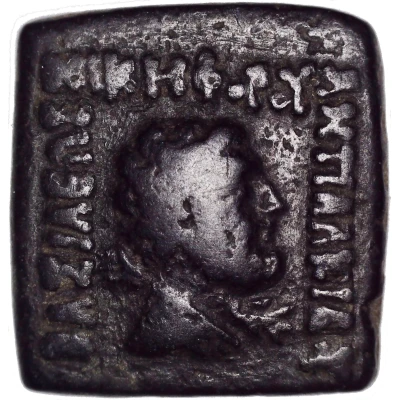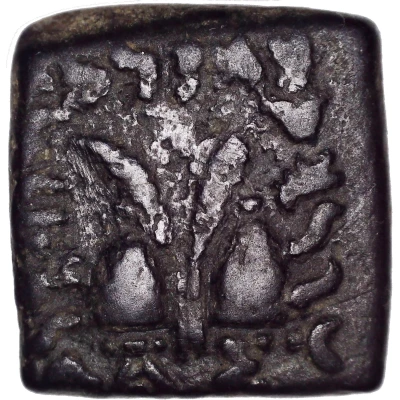


© David E. Anderson
½ Obol - Antialcidas 115 BC - 95 BC
| Copper (perhaps CuSn) | 9.21 g | - |
| Issuer | Indo-Greek Kingdom (India (ancient)) |
|---|---|
| King | Antialcidas (Αντιαλκίδας) (115 BC - 95 BC) |
| Type | Standard circulation coin |
| Years | 115 BC - 95 BC |
| Value | hemiobol (4 Units) - 4 Chalkon? |
| Currency | Drachm (200 BC to 10 AC) |
| Composition | Copper (perhaps CuSn) |
| Weight | 9.21 g |
| Thickness | 4.0 mm |
| Shape | Square (irregular) |
| Orientation | Medal alignment ↑↑ |
| Demonetized | Yes |
| Updated | 2024-10-10 |
| Numista | N#176920 |
|---|---|
| Rarity index | 91% |
Reverse
Caps and palms of the Dioscuri, monogram at left, Kharoshthi legend on three sides
Lettering: maharajasa / jayadharasa / amtialikidasa
Comment
Antialkidas (aka Antialcida Nikephorus) - Eucratid dynasty - minted 115 to 95 BC. He (Greek: Ἀντιαλκίδας ὁ Νικηφόρος; epithet "Nikephorus" meaning"the Victorious") was a Greek King of the Indo-Greek Kingdom who reigned from his capital at Taxila. Bopearachchi has suggested that he ruled from about 115 to 95 BC in the western parts of the Indo-Greek realms, whereas R. C. Senior places him around 130 to 120 BC and also in eastern Punjab (which seems better supported by coin findings). Senior does however believe that he ruled in tandem with King Lysias. I don't remember where I got all that but it is accurate with other data I've found.Interesting fact
One interesting fact about this coin is that it features a unique blend of Greek and Indian cultural influences in its design. The obverse side of the coin depicts the Greek goddess Athena, while the reverse side features a representation of the Indian goddess Lakshmi, highlighting the cultural exchange and syncretism that occurred during the Indo-Greek period.